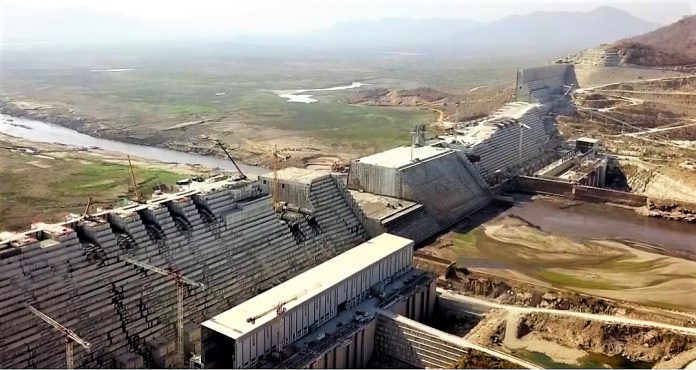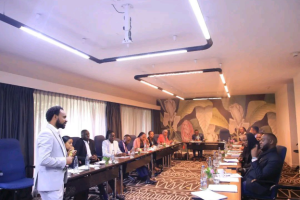
BY HAILE DEMEKE
The trilateral negotiations being held among Ethiopia, Egypt and Sudan in how to fill and operate the Grand Ethiopian Renaissance Dam (GERD) is still at standstill.
The three countries have been meeting and discussing in outstanding issues, no deal is yet to be produced. The talks rather have been put on hold. But the negotiation has resumed last week which was chaired for the first time by the DRC after it took over the chairmanship of the AU from South Africa.
However, the talks ended without finding the binding agreement once again just like the predecessors. The parties to blame are Sudan and Egypt that sought to give observers as equal status as the AU. Many argue that the two countries have gone to Kinshasa with a prior decision to just abort it before it ends.
Ethiopia supported the draft submitted by the Chairperson of the AU with minor adjustments. However, Egypt and Sudan rejected the draft demanding the role of observers to replace that of the three countries and the AU, Ministry of Water, Energy and Irrigation announced.
The two countries followed an approach that seeks to undermine the AU-led process and to take the matter out of the African platform looking for quartet negotiation.
Commenting on the quartet mediation proposed by the two downstream countries, Ethiopian GERD Negotiating Team Member and expert on trans-boundary river, Ambassador Ibrahim Idris told The Ethiopian Herald lately said that “the idea of quartet mediation is not a genuine proposal on the part of Egypt and Sudan but a trap for their cynical goal.
The suggestion for involving the quartet is to pressure Ethiopia to accept their proposal which will strip the rights of the country to develop its water resources. The purpose of involving the quartet is to prolong the forthcoming second filling of the dam and undermine Ethiopia’s right to equitable and reasonable use of the Nile waters, he added “Water sharing issues have always been resolved through negotiations based on international water law. We should resolve the issues based on criteria not by the decision of third parties.”
Despite, the constant flip-flopping of the two countries and their disregard to AU capacity to broker a negotiation, Ethiopia still pins hope on the AU-led negotiation towards the resolution of the dispute on the GERD only on the basis of equitable utilization rejecting any claim of historical rights.
Ethiopia who invited its downstream riparian to negotiate on its own hydro-electric generating dam on a river it originates from its lands. The US didn’t do it on its Hoover dam in Colorado in relation to Mexico. Turkey didn’t do it on its Ataturk dam in relation to Syria and Iraq. China didn’t do it either on its Mekong River in relation to its five downstream riparian.
Posing query regarding the usage of the river is one thing and what the Egypt is doing is blocking Ethiopia not to use the river and maintain their colonial hegemony over the river, said lecturer of Law at the Addis Ababa University Dr. Sisay Mengiste.
On the other hand, they are exerting pressure on Ethiopia simply for the fear of Ethiopia’s development. Most of the Ethiopians are living out of light and in contrary more than 95 percent of Egyptian people have access to electricity.
The downstream countries are continuously working in confusing the international community rather than engaging rationally in the talks. Egyptian President Abdel Fattah Al-Sisi against “No one can take a drop of water from Egypt and whoever wants to be tested” and Egypt has no moral ground to say this while it contributes no drop of water to the river.
Ethiopia is providing all necessary possibilities not to cause significant harm and the Egyptian need to take the advantage of Ethiopia’s notion of equitable and reasonable utilization the resource.
Minister of Water Irrigation and Energy Seleshi Bekele (PhD) said that after the talks that Egypt and Sudan have made unconstructive attempts to block the progress of African Union-led negotiations on the GERD in the latest round of talks in Kinshasa.
He stated that due to Egypt and Sudan’s negative approach towards AU-led negotiations, the Kinshasa’s deliberation was ended with no progress being made. The two countries have also made attempts to disrupt AU’s efforts to discharge its entrusted responsibility of seeking African solutions to Africa’s problems.
The minister further stated that Egypt and Sudan deliberately employed a strategy to hamper the progress of the talks whilst their request to the removal of South Africa from its observer status is not suited to AU’s status as a continental body. In Kinshasa, both Egypt and Sudan were mainly concerned to alter the negotiation’s procedure and they were mesmerized by how to conduct the talks rather than engaged in constructive dialogue.
Ethiopia`s resolve to reach a settlement on the first filling and related operation of the dam failed to bear result due to Egypt’s and Sudan’s rigid stance to make the negotiation and the outcome a tool to affirm their self-claimed water share and foreclose Ethiopia’s share. Ethiopia cannot enter into an agreement that would foreclose its current and future legitimate rights over the utilization of the Nile.
The second-year filling of the GERD will be carried out as scheduled pursuant to the Declaration of Principles (DoP). Accordingly Ethiopia expressed its readiness to facilitate data and information exchange on the filling of the dam. The positions contesting the filling of the dam ahead of the conclusion of an agreement has no basis in law and contravenes Ethiopia`s inherent right to utilize its natural resource.
Still now the major sticking point is that Ethiopia wants the GERD talks to be led solely by the African Union. “The government of Ethiopia said that Egypt and Sudan came up with points that were not part of the agenda, such as postponing the filling of the GERD until a deal is reached which are against the DOP principles.”
The government of Ethiopia repeatedly said that the country never wants to harm the downstream countries Egypt and Sudan; however, want to ensure fair and equitable use of Nile waters based on the contribution and international law of trans-boundary Rivers.”
Ethiopia respects win-win approach on the dam and strongly believes that evidence-based and peaceful negotiation is the only option to reach a binding agreement among parties. Ethiopia has an unwavering commitment towards peaceful negotiation on the GERD, said spokesperson of Ministry of Foreign Affairs of Ethiopia Ambassador Dina lately.
Ethiopia did underline its most preferred option that the negotiation remains with the AU framework rejecting the idea of changing the modality to quartet mediation. Ethiopia believes that the matter at hand, the GERD, is an issue among Ethiopia, Sudan and Egypt and lack of an agreement has nothing to do with who the mediator is, rather what are the compromises offered by the parties is what is halting progress, he added.
The Ethiopian Herald April 16/2021




